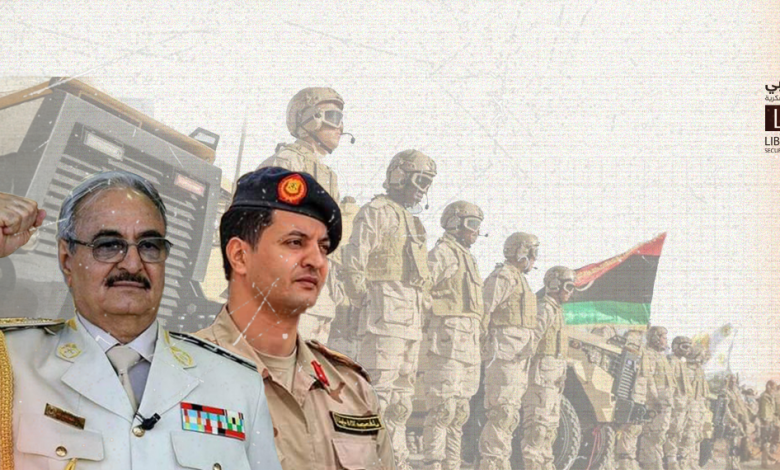Khalifa Haftar: Stage decisions or necessity

The Commander-in-Chief of the Libyan Arab Armed Forces affiliated with Parliament, Field Marshal Khalifa Haftar, issued Resolution No. 220/2023 on July 7, 2023 , which stipulates the creation of a new corner called the “Security Units Corner.”And the decision stipulated in its third article to assign “Brigadier General / Khaled Khalifa Belqasem” as his commander, and the military units should include “Brigade 106 Majhafel and Major General Khaled bin Al-Walid” to this new pillar “Corner of Security Units”, and the Operations Authority prepares the structure This decision is effective from the date of its issuance – as stated in the text of the decision. The issuance of this decision was based on Resolution No. (40) of 1974 regarding service in the armed forces and its amendments.
However, it is noteworthy that this Resolution No. (40) of 1974 , He had identified the components of the Libyan army to include: Land Forces – Naval Forces – Air Forces – Air Defense Forces.
This decision brings to mind the decision of the Provisional General Committee for Defense, No. 54 of 2001 regarding the duty of guarding, protection, insurance, defense and liberation, The decision stated in its second article: The following units are charged with the duty of guarding, securing, defending and liberating:
- (Guarding / assigned to the following units: Al-Jafel 219 Security Units affiliated to the Chief of Staff of the security units – the Green Revolutionary Guard – the People’s Guard – other revolutionary formations – regular bodies, whatever their character, military or civilian.
Also interesting, That “Khaled Khalifa Belkacem” was defined by the decision as a Brigadier General, It was not known that “Khalid Khalifa Belkacem” had attended the Command and Staff Control Course. Or originally graduated from one of the specialized military colleges.
Here it may be useful to mention, The Libyan Command and Staff College is a prestigious educational institution. Its main mission is to prepare and qualify – the command and staff officers – to lead the Libyan army units in peace and war. It is also entrusted with supervising the preparation of military and strategic research and studies. in the field of defense and national security.
whereas , The Command and Staff College was established pursuant to Resolution No. (48) of 1984 and from its inception until its cessation in 1994. A number of (7) courses were held for the General Staff. A number of Libyan officers graduated from it. Among them was the former Chief of Staff of the Libyan Army, “Major General \ Yusuf al-Mangoush,” one of the graduates of the second batch. In addition to a number of other officers from the Republic of Sudan, These courses were held with the assistance and supervision of teaching staff from Russia and Syria at the time.
But , And because of the policy of marginalization and systematic destruction of the military establishment in Libya by the former regime, Lack of interest in specialized educational institutions that qualify military leaders. college stopped working, Until it resumed its incomplete activity in 2006, With the help of a teaching staff from the Arab Republic of Egypt, In addition to qualified Libyan officers with higher education degrees, Teaching continued until the end of 2009. Where he graduated from it during that period, Libyan officers, They had a prominent role as field commanders in the battles fought by the February 17 revolutionaries. Among its graduates at that time were also, A number of officers of sister countries (Egypt, Algeria, Sudan, Mauritania).
The question now arises, What are the real motives for establishing a new corner under the name “Security Units Corner”?? , Why would someone call her unprofessional? And outside the military? Is it the beginning of a parallel army? Reproducing the experience of the previous regime?
Conclusion
Noteworthy it can be said, The formation of parallel security and military bodies could have several negative effects on the country. and hinders efforts to rebuild the state, achieving stability and security, For example, the presence of bodies parallel to the military institution leads to:
- Undermining the sovereignty of the state and the centralization of defense and security in it, weak central government authority, leading to the division of the country, Increased chaos and unrest.
- Causing confusion and imbalance in the national security of the country, which threatens national security, For the possibility of using these objects to enhance internal warfare, the disintegration of the state, And dividing the country into regions according to military, political and regional affiliations.
Although, that some armed factions, Military alliances claim to form parallel security and military agencies to protect society. and national interests, However, this type of body generally leads to the promotion of chaos. The exacerbation of the Libyan crisis and its prolongation
Therefore, on all executive state institutions, Legislative work to unify security and military efforts. under the authority of official institutions, Under the supervision of an elected government, And strengthening the laws and legislations that control it within the framework of the supreme interest of the country.
July 11, 2023
To download the file, click here
This content is also available in:
العربية
Français
Türkçe
Italiano

